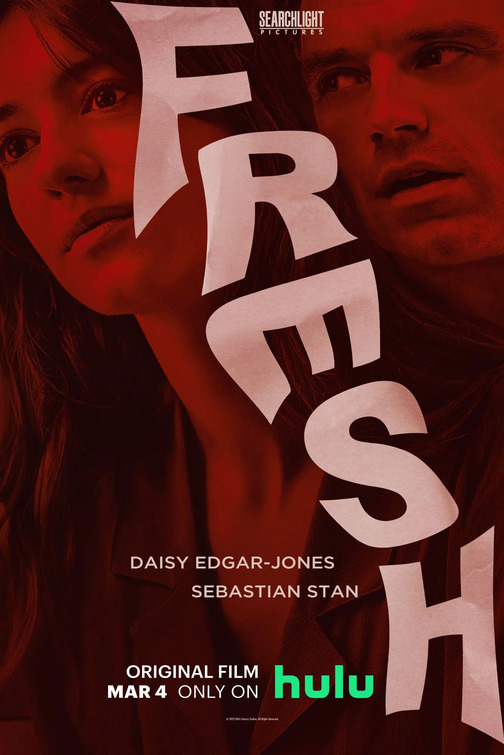
News
Garber Privately Tells Faculty That Harvard Must Rethink Messaging After GOP Victory

News
Cambridge Assistant City Manager to Lead Harvard’s Campus Planning

News
Despite Defunding Threats, Harvard President Praises Former Student Tapped by Trump to Lead NIH

News
Person Found Dead in Allston Apartment After Hours-Long Barricade

News
‘I Am Really Sorry’: Khurana Apologizes for International Student Winter Housing Denials
‘Fresh’ Review: Mimi Cave’s Directorial Debut Sinks Its Teeth Into The Dark Underbelly of Modern Dating
Dir. Mimi Cave — 4.5 Stars

Everyone knows dating can be difficult; it seems like every other Tinder date is a near-horror story. But what would happen if you met the perfect partner, in a “normal way,” like at the grocery store? Would you be more trusting of their intentions? Director Mimi Cave answers this question in the funny, frighteningly dark, and sensual fever dream that is “Fresh.” Starring “Normal People”’s Daisy Edgar-Jones and “Pam and Tommy”’s Sebastian Stan, “Fresh” explores the social intricacies of modern dating through the tale of a cautious young woman, Noa, and her struggle to escape her new boyfriend’s unusual passion project. The intimate cinematography, uncomfortable close ups, and ironically light-hearted moments come together to craft a romantic comedy gone wrong, bolstered by the feminist commentary interwoven throughout the film. Cave toes the line of comedy and horror with a deft hand in her captivating first feature film, and she forcefully subverts the “rom-com” mold through a gruesome twist to illuminate the harsh reality of modern dating for women.
While the film’s first half is visually bright, replete with a comically bad first date and Noa’s gossip with her best friend, Mollie (Jonica T. Gibbs), the voyeuristic shots watching Noa (Daisy Edgar-Jones) from behind a billboard or from inside her fridge are reminiscent of a genre more sinister and animalistic. The various closeups of chewing mouths, men eating, meat, and food are uncomfortably carnal, and undercut the sweet romantic charm of the first act. There’s a pervasive darkness that is antithetical to the original storyline, which while confusing at first, is all the more satisfying when the true nature of the story begins to unfold. The eerie hints sprinkled throughout the first act culminate in Steve (Sebastian Stan) kidnapping Noa, the true start of the film.
At this turning point, the predictable core of the film diverges in a deep straddle over horror and romance. Steve continues to pursue Noa, insisting that he likes her and that he’ll cook for her and make her life enjoyable. There are montages of him dancing around the kitchen, the cheerful and cheesy air guitar moves undercut by the violent reality of the film. Steve continues to behave as if he’s in a romance. He woos her, brings her magazines, and gives her thoughtful compliments that somehow seem genuine despite the manacles that enchain her wrists. Noa, on the other hand, settles into the role of a chillingly determined captive and crafts a plot to win her freedom. This contrast emphasizes the vast and unbridgeable divide between the way Noa and Steve, and perhaps men and women, view dating.
Stan’s easy-go-lucky Steve is arrogant, magnetic, and uncomfortably genuine despite the context of his character. His chemistry with Edgar-Jones is undeniable, and the film relies heavily on it to legitimize the tenuous and terrifying romance that forms between them. Yet, it’s Edgar-Jone’s heartfelt portrayal of a fracturing woman that makes the film truly shine. Her heartbreaking sobs of “I’m so fucking stupid” after she’s been kidnapped give audiences the first glimpse of the subverted reality of the rom-com genre. While she, like many women in many rom-coms before her, decides to take a risk in the chase for true love, the meet-cute is shattered by Steve’s true intentions. The chilling reality of the storyline is driven by Edgar-Jones’ dynamic performance, further strengthened by the true chemistry with her fellow victims, Penny (Andrea Bang) and Mollie.
Ultimately, the darkly ironic comedy and romance of the first two acts breaks to reveal the heartbreaking reality of the film as the women push toward freedom. While “Fresh” may be a comedy, its carefully plotted path through the plight of modern womanhood culminates in a partial victory, the exaggeration and animalistic cinematography giving way into a shocking reality. Crave emerges triumphant in crafting a story that is both entertaining and poignant, a touching portrait of women looking out for one another in a world that continues to be dominated by men.
Want to keep up with breaking news? Subscribe to our email newsletter.
